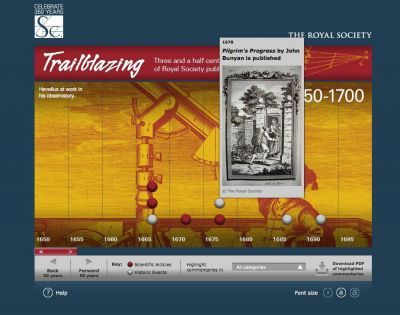Britain's Royal Society puts rare scientific manuscripts online

Your support helps us to tell the story
From reproductive rights to climate change to Big Tech, The Independent is on the ground when the story is developing. Whether it's investigating the financials of Elon Musk's pro-Trump PAC or producing our latest documentary, 'The A Word', which shines a light on the American women fighting for reproductive rights, we know how important it is to parse out the facts from the messaging.
At such a critical moment in US history, we need reporters on the ground. Your donation allows us to keep sending journalists to speak to both sides of the story.
The Independent is trusted by Americans across the entire political spectrum. And unlike many other quality news outlets, we choose not to lock Americans out of our reporting and analysis with paywalls. We believe quality journalism should be available to everyone, paid for by those who can afford it.
Your support makes all the difference.Historic manuscripts by Sir Isaac Newton, Benjamin Franklin and other ground-breaking scientists will be published online for the first time, Britain's Royal Society said Monday.
The society, the world's oldest scientific institution, will release famous literature on the web that it has published in its journals over the centuries as part of celebrations to mark its 350th anniversary.
The works include a 1770 scientific study confirming that composer Wolfgang Amadeus Mozart was a genius and, more recently, acclaimed British scientist Stephen Hawking's early writings on black holes.
Called Trailblazing, the interactive site contains 60 articles chosen from among the 60,000 that have appeared in the Royal Society's journals.
"The scientific papers on Trailblazing represent a ceaseless quest by scientists over the centuries, many of them Fellows of the Royal Society, to test and build on our knowledge of humankind and the universe," said Royal Society president Lord Martin Rees.
"Individually they represent those thrilling moments when science allows us to understand better and to see further."
Newton's theory on light and colours in the 1600s, that continues to provide the basis for theoretical physics, will be published along with a gruesome account of a 17th-century blood transfusion.
A paper by Benjamin Franklin, one of the founding fathers of the United States, will also be released on an experiment to fly his kite in a storm to prove that lightning is electricity rather than a supernatural force.
The Royal Society will also be running events over the next 12 months to celebrate its anniversary "to inspire scientists, families, young people and interested members of the public alike to see further into science," Rees said.
The Royal Society, which supports young scientists and influences scientific debate, started out as a college of thinkers who met to discuss the ideas of the philosopher and scientist Sir Francis Bacon.
Its official foundation date is November 28 1660, when 12 members met at London's Gresham College.
The society then met weekly to witness experiments and discuss scientific topics. The name "Royal Society" first appeared in print in 1661.
Trailblazing can be found at http://trailblazing.royalsociety.org.
Join our commenting forum
Join thought-provoking conversations, follow other Independent readers and see their replies
Comments